- Home
- Andrew Wareham
Killing's Reward Page 2
Killing's Reward Read online
Page 2
Samuel smiled politely, as was correct.
“What of the underground workings, Mr Burkenshawe? Is there a problem with water yet?”
“They are not my purview, ma’am, yet I believe there is no problem of the seam drowning just now. I could send a boy to bring Mr Pattisdale to see ye, ma’am?”
That was agreed, and a skinny but not too ragged child was sent at the run into the adit.
“For the while, Mr Burkenshawe, we could perhaps discuss other items of expenditure that occur to you?”
“Yes, ma’am. The matter of tubs, ma’am. I think we might well soon need more, for Mr Pattisdale tells me that he could put on more hewers of coal and so increase our output. If so be we produce more, we must move it, ma’am.”
“So we must, sir. Give me figures, if you would be so good. Tell me how much and how many and I shall see what can be done. Our own smith will no doubt be able to build them. Do you know where the extra men will come from, to work underground, that is?”
“Mr Bragg will explain, ma’am. He has been working with Mr Rowlands at the Palethorpe pit these last months, ma’am, but he is still my superior.”
“I do not wholly understand you, Mr Burkenshawe.”
“Ah! Mr Bragg is by way of hiring men on for the Palethorpe colliery, ma’am, and may send some of those he has found to us here. Mr Heythorne lent his services to Mr Richard Rowlands, ma’am, while the gentleman was learning the trade, one might say.”
Josie knew that but had wondered how much Burkenshawe understood. Evidently very little. Mr Richard Rowlands had shown himself capable of mastering the financial aspects of running a coal mine, and in this case, a pottery as well, but he was unable to master the actual daily operations of a mine, still less the effective ordering of its employees. Mr Bragg had found himself taking on the responsibility for that side of the business rather than advising Mr Rowlands; he would probably not be back to the Thornehills pit.
“Well and good, Mr Burkenshawe. There is much to be said for a sensible expansion of our endeavours. Where have you in mind to build the new smithy, by the way?”
Burkenshawe showed himself capable of a quick response, of thinking for himself, if pushed.
“On flat ground, ma’am, and placed near to a coking oven, such as I have heard of and seen drawings for, if so be you desire one to be built. Three possible places, ma’am, but the wind comes mostly from the west, so the smokes of the oven are best on the eastern side, ma’am.”
He pointed out the places best suited in his opinion. They were joined soon after by the coal-blackened figure of Mr Pattisdale.
“Best I do not stand too close, ma’am. Tedious black and dusty the underground, ma’am.”
“So I have always understood, Mr Pattisdale. I am concerned about water, sir. Is the pit likely to become wet?”
“No, ma’am, not in the next few years. The seam is flat still as we cut underground and the water level is well below our present workings. The beck at the lower end of the dale is far lower than the pit – a matter of about one hundred feet, I would guess. The seam is widening as well, ma’am and ‘twill be none too hard to increase the working face. We will need more of props and of colliers, and perhaps extra rails to the trackway where it runs inside the pit. The costs will be far less than the value of the coals we win, ma’am.”
“So be it, Mr Pattisdale. Go ahead. Mr Burkenshawe, if so be you are to bring in more hands, where will they live?”
Burkenshawe had not considered the question.
“I will bear it in mind. Do you go ahead as we have agreed, sir.”
Josie, Samuel and Nick drove away a little later, satisfied that the new regime had been established at the pit.
“I must speak to Mr Richard Rowlands this week, I feel, Nick. I would wish to discuss matters with Mr Malone as well. He may have something to say about housing.”
Nick could not imagine what until she suggested the erection of terraces of two-up, two-down back to back and very cheap houses, to be rented to workers in potteries and pits.
“The trouble with renting houses must be to collect the shillings each week, Nick. Few would choose to enter arrears with Mr Malone, I suspect.”
“Wise indeed, ma’am! No sensible man would do so. I will inspect the distilleries today, ma’am, in order to introduce myself to them. I have never tried to manage an enterprise before, ma’am. I do not doubt I shall enjoy the challenge.”
A month and Josie found the coins to be rolling in satisfactorily. The question then arose of what to do with them. She could not believe that simply to place them into an account with Mr Martin at the bank was best. He offered a steady two per centum, at compound interest calculated monthly. It was a meagre return, she thought. There must be a way of doing better, several ways in fact.
What would make money? How did ordinary folk spend their wages?
Food was an obvious answer, particularly for those who were employed as wage hands and could not grow their own and had little free time for cooking or baking.
Bread demanded hours of the housewife’s day. Every town had small bakeries to supply those who could not produce their own, normally for the genteel elderly with a few coppers who did not wish to go to the effort and expense of firing up their own oven each day.
“On a greater scale, Nick, we could produce bread for the collier families who work all day and must bake on a Sunday, and whose loaves will be very stale come Saturday. Sold at the pithead in our own little store, baked there using our own coals, we could provide the hands with better food and pick up a respectable profit as well.”
It was an idea of genius, Nick said. Well-fed workers would be able to produce more, and their children would thrive, as was only right.
“When is your lady due, Nick?”
“Soon indeed, my lady. Not soon enough for her, I doubt not.”
“A son in your image, Nick?”
“Or a daughter in her mother’s, my lady. A healthy child to grow up strong is all I hope for.”
There was much about Nick which she could like, she believed. There was also much which was utterly abhorrent in the man. It was strange, she thought, that a single man could combine good and evil to such a marked degree. Manichean, she suspected, having read less than she might have liked of philosophies. She could now wonder about her own late husband – a kind, generous, loving father and a good man to her and yet also a man of blood, if the whispers were to be believed. It was difficult to reconcile the distinct aspects of his character. She might fear the same behaviour in her son, perhaps, inherited from his papa; she must observe him carefully as he grew older.
She sat to try to calculate the costs and profits of a bakery and a food store at the pit, soon persuaded herself that she must attempt the project. She was irritated that it was impossible to find a builder who would accept a contract from a woman, the local men all being traditional in their ways. She thought she might mention the problem at her next meeting with Nick.
“How goes it in the distilleries, Nick?”
“Well indeed, my lady. I have moved young Jonas Crabtree into a place of greater responsibility, despite his age, and he is showing a deal of precocity in his keeping of the ledgers. I am inclined to wonder whether we might not wish to establish another distillery on the river, my lady, and make sales in the newer places where potteries are being established. The roads are so poor that we ought to produce our bottles close to where they are consumed, and we must wish to sell more and take our little profit on each bottle that goes out of our doors. I have made so bold as to consider locations, and actual buildings which might be used for the purpose, my lady.”
“You must show me your calculations, Nick. It may well be possible to find funds for the purpose. I worry sometimes, Nick, about the Excise men. Might they not seek to tax us one day? Is it safe to grow larger and perhaps be more prominent?”
He did not know… He should be informed, he decided.
“I shall seek inf
ormation on the Excise, my lady.”
“I think you should, Nick. While you are discovering all you may, and talking about the subject, information, that is, do you know who put an end to my husband’s career, Nick?”
“I do not, my lady. It was not a local man in the trade, that is for sure, for I have made deep enquiries of them. I am of a mind to take a trip into Lancashire, my lady, to ask of people there.”
“Why there, Nick?”
“Sir Charles Wakerley, my lady, possesses an estate there, granted him for his good service during the Rebellion. I wonder if he might not have hired a bravo there and sent him here for the purpose. Should I discover that to be so, then I might well be forced to speak to my little friends about him.”
She had just enough native caution not to enquire who or what his little friends might be. She wondered if he should go off to Lancashire for the while.
“How is your lady, Nick?”
“In imminent expectation, my lady. I should return to her side. I shall not venture into Lancashire just yet.”
“No, you should not… Why Sir Charles, Nick?”
“I have discovered, my lady, that he had suggested to Mr Malone that he might wish to supplant your late and so greatly admired husband. In company with Mr Parsons he was, when he did so. Now, my lady, one may well say that a man is entitled to speak his mind as he wishes, and I am sure indeed that Mr Malone rejected his suggestion – so no harm was done on that occasion. But, my lady, he might well have spoken elsewhere, to greater avail.”
She fell silent, looking downwards, taking her own counsel. A couple of minutes and she looked Nick in the eye.
“If you discover the assassin, Nick, then speak to him and ask him all he knows. I do not doubt that you can persuade him to confide in you. If he tells you of his employer, then I would be much obliged to you, Nick, if you would serve him out his own medicine. Whoever and whatever he may be, Nick!”
Nick would be happy to oblige, he assured her.
“Your late husband, my lady, will be looking down on you and expressing his admiration. Truly, my lady, that is a decision worthy of him.”
Nick was most surprised to learn of the ill manners of local builders and promised to speak to one just as soon as he had the time.
Nick’s lady – he never referred to her as his wife and Josie would not presume – produced a daughter that night, a strong and healthy little girl to the pleasure of all. She had milk in plenty and all was well, so much so that Nick was able to take a horse northwards within the week. His first call was in Lancaster itself, at the cottage of a Sergeant Wright who had been mentioned to him by Sam – a good friend and one who might know what was happening locally.
“Young Sam, sir? You tell me he is dead? No great surprise – I liked the lad, but he was not one to make old bones. He found the killing part of soldiering to come only too easy, I believe. Captain Wakerley? A good soldier. I have not seen him since settling down here in Lancaster, though one or two of the lads I knew have mentioned his name in passing. You might wish to be speakin’ to them, now?”
He gave several names, having decided that no wise man would do otherwise than cooperate with Nick. He had the feel of a dangerous man, did Nick, and Sergeant Wright was enjoying his peaceful later years.
Nick made his thanks and refused the offer of tea made by the sergeant’s wife, a comfortable widow lady who had taken on a second husband with a good wage coming in each week and a warm cottage. As a soldier for many years Sergeant Wright had a few rough edges, but he was a most reliable provider and she thought she had, on balance, done well.
Two hours later and Nick had confirmation that Captain Wakerley had asked more than one of his old troopers of the name and location of an assassin. Evidently Sir Charles had no connections among the criminal classes; he had assumed, rightly enough, that some of his one-time followers would have. Nick had the name of one Blagger Bob before the end of the day and the certainty that he had done the actual act.
“Hard man, that one, sir. Won’t talk to nobody about what ‘e done nor who paid ‘im.”
Nick knew enough by then to have no need to interrogate the killer.
The next afternoon Nick wandered into a drinking house in the small city, not so far from the river and the slaving port and within easy sight of the castle. Its location made it a favourite of the crews from the slave ships, some of who evidently made money on the side from other violent enterprises. He spoke to the barman, who knew nothing and nobody until a half-guinea was placed in his hand; for ten shillings and sixpence, he would evidently name every patron the pub had ever had.
‘“In the blue shirt, with ‘is back to you, at the table of four, playing cards. Been hanging about for two month now, come into a windfall, so ‘e did. So ‘e says. Reckon ‘e did some bugger over of a dark night and ‘e ‘ad a fat purse.”
“Shocking, sir – I never fail to be horrified by the doings of my fellow man. A violent robber, you fear? How very sad.”
“You ain’t a constable, is you?”
“Good Lord, no, my man! A mere humble philanthropist am I, dedicated to making the world a better place by removing excrescences from it.”
“What?”
“Actions speak louder than words, my good fellow.”
Nick strolled across to the card table where he politely waited for a hand to finish.
“Blagger Bob?”
“So what if I bloody am?”
Nick slashed a razor across his throat, deep and very quick. He stepped back as the arterial blood sprayed across the table, quite spoiling the deck of cards.
“You killed my good master. An error, sir.”
Nick was gone in seconds, before any there thought to block the door. He was riding out of the city on the road south within minutes, sure there would be no hue and cry raised, no pursuit mounted.
And there, Nick mused, went the hand that committed the act. The mind behind it must come next.
He continued south, dismissing the act which had created some degree of uproar in the small city, his mind bent on his next commission.
Chapter Two
Killing’s Reward
Section One - AD 1752
It was only a small roadside inn, not even a posting house, but it was comfortable and the rain had set in and Nick had no wish to ride further on the day.
He had taken a room and ordered a dinner and set his horse into the stables, the ostler given his instructions and a groat coin to carry them out. Then he had called for a pint and congratulated the landlord on the quality of his brew and had sat to dry out and get warm at the fire in the public room. He felt at peace with the world, the first part of his labour of love complete.
He took his favourite razor out of its expensive shagreen case and laid it on the table to his front. From another pocket he unfolded a piece of soft woollen cloth and then a cleaning rag.
“Now, my dear, let us get rid of this nasty blood. A very common sort and you will not wish his contamination to remain on your beautiful, shining steel… There you are now! Better by far, is it not? A long, slow, gentle polish next and all will be right again. Never fear, little lady, I shall feed you better next time – a baronet and military officer perhaps and not impossibly a town mayor and Chairman of the Bench as well. Far more to your taste than a mere, vulgar beast of a slaver – ‘Blagger Bob’, forsooth! What sort of name is that for a lady of delicate discrimination such as yourself? Put it behind you, my dear – I shall not soon require you to stoop so low again!”
The landlord, who had listened with open-mouthed horror, fled into his kitchen where he ordered his wife to produce the meal of her lifetime.
“Mad as a March hare, so he do be, missus! Sat there a-cleaning the blood off a razor and talking to it as if it were ‘is own lady. Madder nor any March hare what ever I did see, thinking on it. Do you stay safe in the kitchen this afternoon, missus – thee don’t want to be out anyplace near his sort.”
She tent
atively suggested that he might consider giving information to the magistrate or calling on the services of the parish constable.
“Ain’t neither of they likely to thank me for so doing, missus! Suppose I told they, then they’s going to have to do something about it. Ain’t neither of they in the habit of picking up loonies what talks to cutthroat razors – and I ain’t going to give they a hand to be doing it neither.”
“Maybe Jemmy ostler could come in, husband?”
“I needs he to be looking to horses, not getting his throat cut, not for nine shillings a week and his keep and the room in the stable loft. And he do tell me he’s thinking of taking a wife, and what am I to do for him then?”
Jemmy’s improvidence in even considering getting wed was of far greater significance than a lunatic who would be gone in the morning. They fell to discussing what was to be done and whether they might be better off getting a new ostler instead. Eventually, they returned to the topic.
“What about that madman in the public room then, husband?”
“Oh, bugger him! It’s raining too hard to be walking up the road to the magistrate.”
Nick left in the morning, placing a careful tip of sixpence, half as much again as he had given the groom, as was only right, in the landlord’s hand and thanking him for his good service, unaware of his near run-in with the law.
“I shall certainly stay here again if next I must go to Lancaster, host. Fare thee well, now.”
The landlord waved from his door as Nick set off, much hoping that he would never have business in any part of the county again. Weeks later, he read a copy of the monthly newssheet and discovered that a villain’s throat had been cut in broad daylight almost in the centre of Lancaster. Four seamen who had been playing at cards with the victim had been arrested, it making only sense that they must have committed the heinous crime.
“And I ain’t showing my nose to tell ‘em they’re wrong. Don’t want that one coming back here to talk to me instead of them razors of his.”

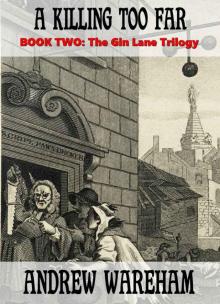 A Killing Too Far
A Killing Too Far Killing's Reward
Killing's Reward A New Place
A New Place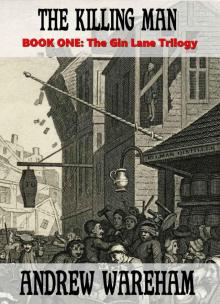 The Killing Man
The Killing Man Bold and Blooded
Bold and Blooded The Breaking Storm (Innocent No More Series, Book 2)
The Breaking Storm (Innocent No More Series, Book 2) Nobody’s Child
Nobody’s Child 04 Peking Nightmares (The Earl’s Other Son Series, #4)
04 Peking Nightmares (The Earl’s Other Son Series, #4) Red Man
Red Man Foreign Mud
Foreign Mud The Gathering Clouds (Innocent No More Series, Book 1)
The Gathering Clouds (Innocent No More Series, Book 1) 06 A Soldier’s Farewell (Man of Conflict #6)
06 A Soldier’s Farewell (Man of Conflict #6) Chinese Whispers
Chinese Whispers 02 Shanghai Dreams (The Earl’s Other Son #2)
02 Shanghai Dreams (The Earl’s Other Son #2) Hungry Harry: An Orphan in the Ranks
Hungry Harry: An Orphan in the Ranks A Wretched Victory (Innocents At War Series, Book 6)
A Wretched Victory (Innocents At War Series, Book 6) Illusions Of Change (A Poor Man at the Gate Series Book 6)
Illusions Of Change (A Poor Man at the Gate Series Book 6) The Wages Of Virtue (A Poor Man at the Gate Series, Book 8)
The Wages Of Virtue (A Poor Man at the Gate Series, Book 8) Blood and Famine (Man of Conflict Series, Book 4)
Blood and Famine (Man of Conflict Series, Book 4) The Friendly Sea (The Duty and Destiny Series, Book 1)
The Friendly Sea (The Duty and Destiny Series, Book 1) Bursting Balloons (Innocents At War Series, Book 5)
Bursting Balloons (Innocents At War Series, Book 5) The Death of Hope
The Death of Hope Deadly Shores (The Duty and Destiny Series, Book 11)
Deadly Shores (The Duty and Destiny Series, Book 11) The Vice Of Virtue (A Poor Man At The Gate Series Book 10)
The Vice Of Virtue (A Poor Man At The Gate Series Book 10) Virtue’s Reward (A Poor Man at the Gate Series, Book 11)
Virtue’s Reward (A Poor Man at the Gate Series, Book 11)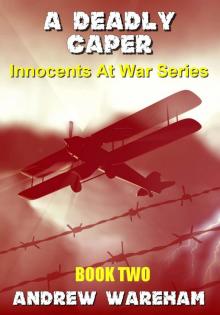 A Deadly Caper (Innocents At War Series, Book 2)
A Deadly Caper (Innocents At War Series, Book 2) The Pain Of Privilege (A Poor Man at the Gate Series Book 4)
The Pain Of Privilege (A Poor Man at the Gate Series Book 4) Far Foreign (The Duty and Destiny Series, Book 9)
Far Foreign (The Duty and Destiny Series, Book 9)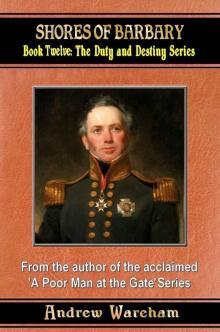 Shores of Barbary (The Duty and Destiny Series, Book 12)
Shores of Barbary (The Duty and Destiny Series, Book 12)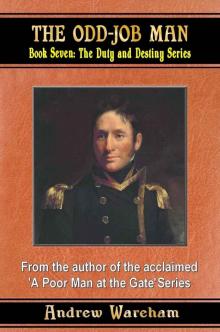 The Odd-Job Man (The Duty and Destiny Series, Book 7)
The Odd-Job Man (The Duty and Destiny Series, Book 7) Fire and Folly (Man of Conflict Series Book 3)
Fire and Folly (Man of Conflict Series Book 3) A Victorian Gent (The Making of a Man Series, Book 1)
A Victorian Gent (The Making of a Man Series, Book 1) Sugar and Spice (The Duty and Destiny Series, Book 6)
Sugar and Spice (The Duty and Destiny Series, Book 6) Dark Days Of Summer (Innocents At War Series, Book 4)
Dark Days Of Summer (Innocents At War Series, Book 4) Dire Shenanigans (The Making of a Man Series, Book 2)
Dire Shenanigans (The Making of a Man Series, Book 2) The Fuzzy-Wuzzy Man (The Duty and Destiny Series, Book 3)
The Fuzzy-Wuzzy Man (The Duty and Destiny Series, Book 3) Privilege Preserved (A Poor Man at the Gate Series Book 5)
Privilege Preserved (A Poor Man at the Gate Series Book 5) No Longer A Game (Innocents At War Series, Book 3)
No Longer A Game (Innocents At War Series, Book 3)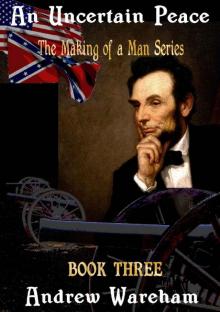 An Uncertain Peace (The Making of a Man Series, Book 3)
An Uncertain Peace (The Making of a Man Series, Book 3)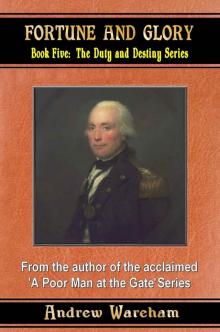 Fortune And Glory (The Duty and Destiny Series, Book 5)
Fortune And Glory (The Duty and Destiny Series, Book 5) The Old Order (A Poor Man at the Gate Series Book 7)
The Old Order (A Poor Man at the Gate Series Book 7) A Place Called Home (Cannibal Country Trilogy, Book 2)
A Place Called Home (Cannibal Country Trilogy, Book 2) Nouveau Riche (A Poor Man at the Gate Series, Book 2)
Nouveau Riche (A Poor Man at the Gate Series, Book 2) The Privateersman (A Poor Man at the Gate Series Book 1)
The Privateersman (A Poor Man at the Gate Series Book 1) Britannia’s Son (The Duty and Destiny Series, Book 4)
Britannia’s Son (The Duty and Destiny Series, Book 4) Long Way Place (Cannibal Country Trilogy, Book 1)
Long Way Place (Cannibal Country Trilogy, Book 1) Spanish Tricks (Man of Conflict Series, Book 5)
Spanish Tricks (Man of Conflict Series, Book 5) A Parade Of Virtue (A Poor Man At The Gate Series Book 9)
A Parade Of Virtue (A Poor Man At The Gate Series Book 9) A Busy Season (The Duty and Destiny Series, Book 8)
A Busy Season (The Duty and Destiny Series, Book 8) Billy Bacon and the Soldier Slaves (Colonial Warrior Series, Book 1)
Billy Bacon and the Soldier Slaves (Colonial Warrior Series, Book 1) Raging Rajahs (Man of Conflict Series, Book 2)
Raging Rajahs (Man of Conflict Series, Book 2) Victorian Dawn (A Poor Man at the Gate Series, Book 12)
Victorian Dawn (A Poor Man at the Gate Series, Book 12) Born To Privilege (A Poor Man at the Gate Series Book 3)
Born To Privilege (A Poor Man at the Gate Series Book 3) The Soldier Brat (Man of Conflict Series, Book 1)
The Soldier Brat (Man of Conflict Series, Book 1)